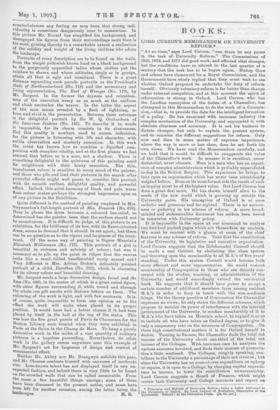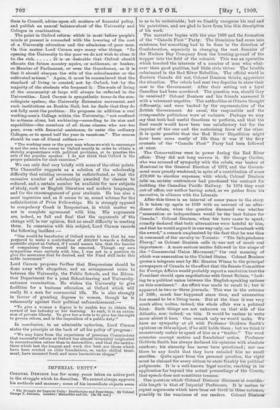BOOKS.
LORD CURZON'S MEMORANDUM ON UNIVERSITY REFORM,
" AT no time," says Lord Curzon, "can there be any pause in the task of University Reform." The Commissions of 1850, 1872, and 1877 did good work, and effected vital changes, but the conditions have so altered in the last .quarter of a century that the task has to be begun again. Bishop Gore and others have clamoured for a Royal Commission, and the Government have wisely replied that they must wait to see whether Oxford proposed to undertake the duty of reform herself. Obviously voluntary reform is far better than change under external compulsion, and at this moment the spirit of reformation is strong in Oxford. Lord Curzon, who has the Landian conception of the duties of a Chancellor, has attempted in this Memorandum to do the work of a Commis- sion,—that is, to provide the data for the intelligent formation of a policy. He has examined with immense industry the complex mechanism of the University, and expounded it with absolute clearness and accuracy. It is not his business to dictate changes, but only to explain the present system, and to examine the different suggestions for reform. Only now and then in some matter of supreme importance, where the way is more or less clear, does be set forth his own views. We have read the Memorandum carefully, and we bold that it would he difficult to exaggerate the value of the Chancellor's work. In manner it is excellent, never dictatorial, never obscure. Here is a man who has an experi- once of complex administration which is probably unparalleled to-day in the British Empire. This experience he brings to bear upon an organisation which has never been scientifically weighed before. Even on its most formal side the result of such an inquiry must be of the highest value. But Lord Curzon has done a great deal more. He has shown himself alive to the needs of the new world which is growing up outside the University gates. His conception of Oxford is at Once catholic and generous and far-sighted. There is no narrow- ness or pedantry in his scheme of reform. A more broad- minded and statesmanlike document has seldom been issued in connexion with University policy.
It is impossible in the space at our command to analyse two hundred packed pages which are themselves an analysis. We must be content with a glance at some of the chief features in any scheme of reform. Take first the constitution of the University, its legislative and executive organisation. Lord Curzon suggests that the Hebdomadal Council should be made a real Cabinet by abolishing the class system and throwing open the membership to all M.A.'s of five years' standing. Under this system Council would become both more efficient and more representative. He would restrict membership of Congregation to those who are directly con- cerned with the studies, teaching, or administration of the University, and would accordingly extend the residential limit. He suggests that it should have power to co-opt a certain number of additional members from among resident M.A.'s in order to keep in touch with the non-academia fringe.. On the thorny question of Convocation the Chancellor expresses no views ; he only states the different schemes, which propose to restrict its power of interference with the internal government of the University, to confine membership of it to M.A.'s who have taken an Honoure school, to expand it so as to include all who have taken an Oxford degree, or to give it only a suspensory veto on the measures of Congregation. On these high constitutional matters it is for Oxford herself to decide. Turning to finance, the Chancellor finds the total net income of the University about one-third of the total net income of the Colleges. With immense care be analyses the various accounts involved, and finds their manner of presenta- tion a little confused. The Colleges, roughly speaking, con- tribute to the University a percentage of their net revenue ; but since the'University has no control over expenditure on upkeep or repairs, ibis open to a College, by charging. capital expendi- ture to income, to lower its contribution unwarrantably. Lord Curzon suggests a Board of Finance, which might review both University and College accounts and report on * Principles and Methods of University Reform : being a Letter Addressed to It,, 'University of 001 d. By Lord Curzon of Kedleston, Chancellor of the University. Oxford ; at the Clarendon Pram [2e. ed. set.] them to Council, advise upon all matters of financial policy, and publish an annual balance-sheet of the University and
Colleges in combination.
The point in Oxford reform whioh is most before people's minds at present is connected with the lowering of the cost of a University education and the' admission of poor men. On this matter Lord Curzon says many wise things. "In opening the University to the poor we do not wish to close it ta- the rich His as desirable that Oxford should eflucate the future country squire, or nobleman, or banker, or Member of Parliament, or even the Guardsman, as it is that it should sharpen the wits of the schoolmaster or the cultivated artisan." Again, it must be remembered that the standard of living is created, not by Oxford, but by the majority of the students who frequent it. The scale of living of the communityt at large will always be reflected in the Universities. Lord Curzon is sympathetic towards the non- collegiate system, the University Extension movement, and such institutions as Ruskin Hall, but he finds that they do not fully meet the problem. He proposes in' addition a real working-men's College within the University, "not confined to artisans alone, but embracing—according to its size and capabilities—the members of all those classes who are too poor, even with financial assistance, to enter the ordinary Colleges, or to spend half the year in vacations." The course should be one of liberal culture
"The working man or the poor man whom we wish to encourage is not the man who comes to Oxford merely in order to obtain, a sketchy acquaintance with political problems, or to practise the arts of the popular speaker. I do not think that Oxford is the proper palaestra for such exercises."
We can only deal very briefly with some of the other points. Tile Chancellor suggests as a solution of the scholarship difficulty that existing revenues be redistributed, so that the excessive number of scholarships awarded for classics be reduced, and a certain number be available for new subjeets of 'study, such as English literature and modern languages, and for the encouragement of poor students. He has also a most ingenious and, as it seems to us, sound scheme for the redistribution of Prize Fellowships. He is strongly opposed to compulsory Greek in Responsions, in which matter we are in complete agreement with him. His arguments are, indeed, so full and final that the opponents of the change will', in our opinion, find no small difficulty in meeting them. In connexion with this subject, Lord Curzon records the following incident :—
"One would-be benefactor of Oxford wrote to me that he was prepared to make a contribution of 430,000 towards a definite scientific object at Oxford, if I could assure him that tho barrier of compulsory Greek would be removed. Tin:nigh my own sympathies were entirely with him, I was not in a position to give the assurance that he desired, and the Fund still lacks this noble increment."
Lord Curzon proposes further that Responsions should be done away with altogether, and an arrangement come to between the University, the Public Schools, and the Educa- tion Department for a joint School-leaving and University- entrance examination. He wishes the University to give facilities for a business education at Oxford which will really fit a man for commercial life. He is also strongly in favour of granting degrees to women, though he is vehemently against their political enfranchisement :—
"To give a woman a degree is to enable her to obtain the reward of her industry or her learning. As such, it is an exten- sion of private liberty. To give her a vote is to give her the right to govern others, and is the imposition of a public duty."
In conclusion, in an admirable aphorism, Lord Curzon states the principle at the back of all his policy of progress :
"We may learn from the experience of previous Commissions that successful reform at Oxford has almost invariably originated in reconstruction rather than.in destruction; and that the institu- tions which last the longest and work the best are those which have been erected on older foundations, or, under skilful treat- ment, have assumed fresh and more harmonious shapes."











































 Previous page
Previous page